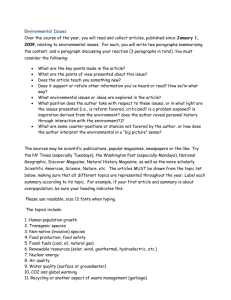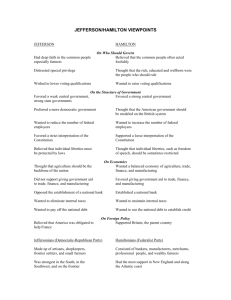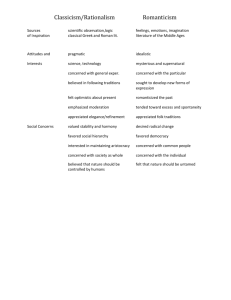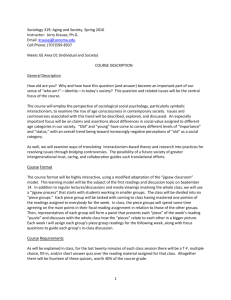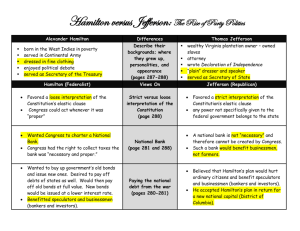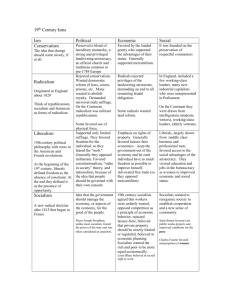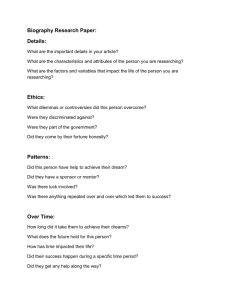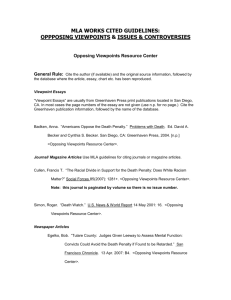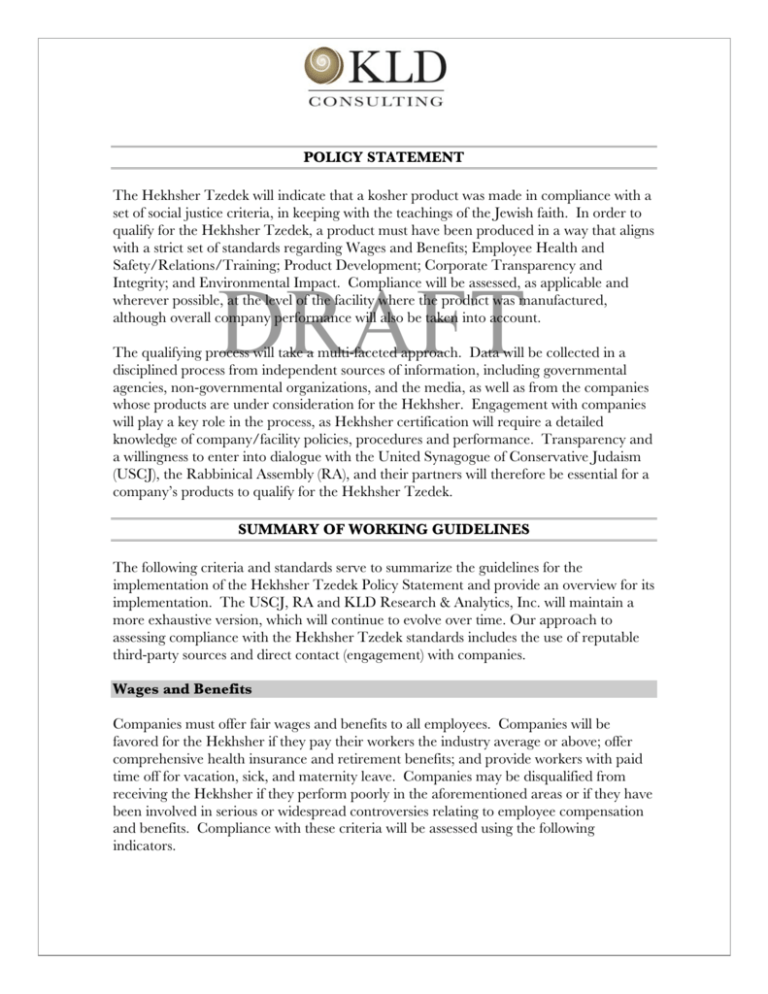
POLICY STATEMENT
The Hekhsher Tzedek will indicate that a kosher product was made in compliance with a
set of social justice criteria, in keeping with the teachings of the Jewish faith. In order to
qualify for the Hekhsher Tzedek, a product must have been produced in a way that aligns
with a strict set of standards regarding Wages and Benefits; Employee Health and
Safety/Relations/Training; Product Development; Corporate Transparency and
Integrity; and Environmental Impact. Compliance will be assessed, as applicable and
wherever possible, at the level of the facility where the product was manufactured,
although overall company performance will also be taken into account.
DRAFT
The qualifying process will take a multi-faceted approach. Data will be collected in a
disciplined process from independent sources of information, including governmental
agencies, non-governmental organizations, and the media, as well as from the companies
whose products are under consideration for the Hekhsher. Engagement with companies
will play a key role in the process, as Hekhsher certification will require a detailed
knowledge of company/facility policies, procedures and performance. Transparency and
a willingness to enter into dialogue with the United Synagogue of Conservative Judaism
(USCJ), the Rabbinical Assembly (RA), and their partners will therefore be essential for a
company’s products to qualify for the Hekhsher Tzedek.
SUMMARY OF WORKING GUIDELINES
The following criteria and standards serve to summarize the guidelines for the
implementation of the Hekhsher Tzedek Policy Statement and provide an overview for its
implementation. The USCJ, RA and KLD Research & Analytics, Inc. will maintain a
more exhaustive version, which will continue to evolve over time. Our approach to
assessing compliance with the Hekhsher Tzedek standards includes the use of reputable
third-party sources and direct contact (engagement) with companies.
Wages and Benefits
Companies must offer fair wages and benefits to all employees. Companies will be
favored for the Hekhsher if they pay their workers the industry average or above; offer
comprehensive health insurance and retirement benefits; and provide workers with paid
time off for vacation, sick, and maternity leave. Companies may be disqualified from
receiving the Hekhsher if they perform poorly in the aforementioned areas or if they have
been involved in serious or widespread controversies relating to employee compensation
and benefits. Compliance with these criteria will be assessed using the following
indicators.
The United Synagogue of Conservative Judaism
The Rabbinical Assembly
Hekhsher Tzedek Policy Statement and Working Guidelines
▪
▪
▪
▪
▪
▪
▪
▪
Worker Pay. The focus of this indicator is on how well factory-level workers are
paid compared to regional and industry averages.
Health Insurance. Companies will be favored for the Hekhsher if they offer
affordable health insurance to all full-time employees and a meaningful
percentage of employees take advantage of the program
Retirement Benefits. Companies will be favored for the Hekhsher if they
offer all full-time employees an adequately funded defined benefit pension plan or
a 401(k) plan through which they match employee contributions. The level at
which the company matches employee contributions will also be assessed.
Vacation. Companies will be favored for the Hekhsher if they offer paid
vacation time to all full-time employees and a meaningful percentage of
employees take advantage of the program.
Sick Leave. Companies will be favored for the Hekhsher if they offer paid sick
leave to all full-time employees.
Maternity Leave. Companies will be favored for the Hekhsher if they offer
maternity leave that exceeds the 12 unpaid weeks mandated by the federal
government.
Controversies. This indicator considers the company’s record with regard to
controversies associated with worker pay and benefits, e.g. non-compliance with
minimum wage or overtime laws, Equal Employment Opportunity Commission
(EEOC) wage discrimination lawsuits, or violations of the Family and Medical
Leave Act.
Subcontractors. Companies under consideration for the Hekhsher will be
asked about their subcontractors’ policies and practices as they relate to the Wages
and Benefits criteria above.
DRAFT
Employee Health and Safety/Relations/Training
Companies must provide a safe and healthy workplace to all employees as well as
adequate training regarding occupational hazards. Companies will be favored for the
Hekhsher if they exhibit a low lost-time incident and employee turnover rate; are
transparent about safety inspection performance; have strong health and safety programs;
provide support for immigrant workers; and offer a satisfactory workplace environment.
Specific to the issue of labor relations, companies will be favored for the Hekhsher if they
have demonstrated a hospitable and progressive relationship with their employees and the
labor organizations that represent them. These companies will value their employees’
contribution to their endeavor, and will involve them and the labor organizations that
represent them in decisions that affect them in the workplace, and their loved ones at
home. They will also foster and encourage the employment and promotion of women
and minorities, and those physically and mentally challenged. They will also provide
appropriate mechanisms for resolving disputes that are binding, easily accessible and
2
The United Synagogue of Conservative Judaism
The Rabbinical Assembly
Hekhsher Tzedek Policy Statement and Working Guidelines
fairly administered. Companies will also be favored who respect employee wishes
concerning representation by labor organizations, whose majority status has been
appropriately demonstrated and maintained, and who adhere to the purposes and
provisions set forth in the National Labor Relations Act. Companies will be disfavored if
they have demonstrated a record of violating labor and employment laws or who
promote or instigate conflict with labor organizations or employees.
Companies may be disqualified from receiving the Hekhsher if they perform poorly in the
aforementioned areas or if they have committed health and safety violations. The
following indicators will be used to assess compliance with these criteria:
DRAFT
Violations, Fines and Penalties. Health and safety violations, at the facility
level. Compliance with this indicator will be assessed by monitoring third-party
media reports, using data provided by regulatory agencies, such as the
Occupational Safety and Health Administration (OSHA) for U.S.-based
operations, and engagement directly with the company.
Lost-time incident rate. Companies will be favored for the Hekhsher if their
lost-time incident rate is better than the industry average.
Safety Inspections. This indicator focuses on the facility’s record with regard
to recent safety inspections - the company’s willingness to share any results from
the inspection with the USCJ/RA, or willingness to request such an inspection
and share the results.
Awards and Certifications. Company and facility-level health and safety
awards and certifications. Companies with, for example, OSHA Voluntary
Protection Programs (VPP) Star facilities and those recently acknowledged for
good safety practices by an industry association will be favored for the Hekhsher.
Safety Management Systems. Health and safety management systems will be
assessed based on the details of the company’s training program relative to
industry peers, and on how many employees receive training and how often.
Companies will be favored for the Hekhsher if they have safety committees that
include worker participation as well as management, and if language-appropriate
training is provided.
Employee Turnover. Companies will be favored for the Hekhsher if the
turnover rate is better than the industry average. Turnover due to the
employment of seasonal workers will be taken into consideration in assessing
performance (depending on the availability of this information.)
Union Relations. Companies will be favored for the Hekhsher if they have a
record of positive relations with unions. Indications of positive relations include
union accounts that a company has taken steps to treat its unionized workforce
fairly; encouragement of unions to organize new workers through cooperative
policies or programs; multiple long-term union contracts; and the absence of
strikes, lockouts or union-related controversies. Indications of poor union relations
include historic patterns of acrimonious relations with unions; the adoption of
3
The United Synagogue of Conservative Judaism
The Rabbinical Assembly
Hekhsher Tzedek Policy Statement and Working Guidelines
union-busting tactics, including the use of replacement workers during strikes;
prolonged strikes/lockouts; expired contracts; strong and well-documented
opposition to unionization efforts; and National Labor Relations Board or labor
law violations at non-union or union facilities.
Discrimination. Well-documented incidents of discrimination towards
employees. Indicators of poor performance in this area include significant fines,
penalties, or lawsuit settlements over allegations of sex, race, age or disability
discrimination against an individual or group; and unresolved discrimination
lawsuits that have attained class-action status. Companies will be favored for the
Hekhsher if they have avoided any major, recent employee discrimination
incidents.
Support for Women, Minorities, and the Disabled. Companies will be
favored for the Hekhsher if they make proactive efforts to have a diverse
workforce, including women, minorities, and the disabled.
Support for Immigrant Workers. Companies will be favored for the
Hekhsher if they make proactive efforts to support their immigrant workers and
have avoided controversies associated with the poor treatment of these workers.
Workplace Environment. Companies will be eligible for the Hekhsher
provided they offer an adequate workplace environment for employees, including
restroom and lunch breaks.
Subcontractors. Companies under consideration for the Hekhsher will be
asked about their subcontractors’ policies and practices as they relate to the
Employee Health and Safety/Relations/Training indicators above.
DRAFT
Product Development
Companies must offer quality products and services, and market them responsibly.
Companies that work with animals should have policies and practices in place to ensure
they are treated humanely at all points of the production cycle. Companies will be
favored for the Hekhsher if they have strong quality management and animal welfare
policies in place. Companies may be disqualified from receiving the Hekhsher if they
perform poorly in the aforementioned areas or if they have been involved in serious or
widespread controversies relating to product safety, marketing, or the treatment of
animals. The following indicators will be used to assess compliance with these criteria:
Animal Welfare Policies. Companies will be favored for the Hekhsher if they
adhere to the Humane Farm Animal Care Standards (HFAC). Companies will
remain eligible for the Hekhsher provided they adhere to animal welfare
guidelines that are endorsed by the Food Marketing Institute (FMI) or National
Council of Chain Restaurants (NCCR.) These include the animal welfare
guidelines of the following producer groups:
o American Meat Institute
o Dairy Quality Assurance-National Milk Producers Association
4
The United Synagogue of Conservative Judaism
The Rabbinical Assembly
Hekhsher Tzedek Policy Statement and Working Guidelines
o National Cattlemen’s Beef Association
o National Chicken Council
o National Turkey Federation
o United Egg Producers
The USCJ and RA view adoption of, and compliance with, FMI-NCCR animal
welfare guidelines as a minimum standard, but encourage the adoption of more
robust animal care standards (i.e. HFAC.)
Animal Welfare Controversies. The company’s record with regard to animal
treatment/cruelty controversies. Companies will be favored for the Hekhsher if
they have avoided any major, recent controversies. In the case of controversies,
efforts will be made to corroborate the claims, including requesting company
comments on the allegations.
Product Marketing Controversies. The company’s record with regard to
marketing controversies or violations, including those relating to deceptive
advertising practices and consumer fraud. Companies will be favored for the
Hekhsher if they have avoided any major, recent controversies or violations.
Product Safety Issues. The company’s record with regard to product safety.
Companies will be favored for the Hekhsher if they have avoided any major,
recent controversies or violations.
Quality Management Systems. Company or facility-level quality
management systems. Strong quality management systems may include those that
adhere to management methodologies such as Six Sigma, The Deming Method,
ISO 9000, and QS 9000.
Subcontractors. Companies under consideration for the Hekhsher will be
asked about their subcontractors’ policies and practices as they relate to the
Product Development indicators above.
DRAFT
Corporate Transparency and Integrity
Companies must operate transparently and with integrity, respecting ethical standards of
conduct and corporate governance. Companies will be favored for the Hekhsher if they
exhibit strong Corporate Social Responsibility (CSR) reporting practices and demonstrate
a willingness to engage in a productive dialogue with the USCJ/RA. Companies may be
disqualified from receiving the Hekhsher if they perform poorly in the aforementioned
areas or if they have been involved in serious or widespread controversies relating to
corporate governance and accounting practices and standards. The following indicators
will be used to assess compliance with these criteria:
▪
Corporate Governance Controversies and Violations. The company’s
record with regard to controversies and violations associated with allegations or
convictions of bribery, insider trading, or other fraudulent activities. Companies
will be favored for the Hekhsher if they have avoided any major, recent
controversies.
5
The United Synagogue of Conservative Judaism
The Rabbinical Assembly
Hekhsher Tzedek Policy Statement and Working Guidelines
▪
▪
Accounting Controversies. The company’s record with regard to
controversies concerning accounting practices. Companies will be favored for the
Hekhsher if they have avoided any major, recent controversies.
Transparency. The company’s CSR reporting practices and willingness to
respond to questionnaires from, or meet with, the USCJ/RA. Strong CSR
reporting will be gauged by the frequency and depth of reporting as well as by
whether a company is a signatory to frameworks such as the Global Reporting
Initiative or Ceres Principles. Companies that have taken an active stance against
transparency, or concealed or lied about CSR performance, will not be eligible for
the Hekhsher.
DRAFT
Environmental Impact
Companies must avoid having a negative impact on the environment, and by extension,
communities located near company facilities. Companies will be favored for the
Hekhsher if they employ strong environmental management systems and demonstrate a
commitment to the environment through the adoption of proactive environmental
initiatives. Companies may be disqualified from receiving the Hekhsher if they perform
poorly in the aforementioned areas; have been involved in serious or widespread
environmental impact controversies; hold substantial liabilities for hazardous waste; are
notably high emitters of toxic chemicals; or have paid substantial fines or civil penalties
for violations of environmental regulations. The following indicators will be used to assess
compliance with these criteria:
▪
▪
▪
▪
Community Controversies. The company’s record with regard to
controversies concerning environmental contamination and its effects on
communities, particularly incidents that lead to community health concerns.
Companies will be favored for the Hekhsher if they have avoided any major,
recent controversies, and efforts will be made to corroborate third party claims,
including requesting company comments on the allegations.
Regulatory Problems. The company’s record with regard to environmental
fines or penalties. Companies will be favored for the Hekhsher if they have
avoided any major, recent fines, penalties and settlements (or proposed fines,
penalties and settlements) from a government regulatory authority.
Hazardous Waste Liabilities. The company’s record with regard to accrued
liabilities for hazardous waste sites, or fines and civil penalties related to hazardous
waste management violations. Companies will be favored for the Hekhsher if they
do not have significant liabilities and have avoided any major, recent hazardous
waste violations.
Toxic Emissions. The company’s emissions of toxic chemicals. Facilities whose
toxic emissions are notably high may not be eligible for the Hekhsher. “Notably
high” will generally be defined as facilities that have emissions above the median
6
The United Synagogue of Conservative Judaism
The Rabbinical Assembly
Hekhsher Tzedek Policy Statement and Working Guidelines
▪
▪
amongst all facilities in the United States. Because this measures absolute
emissions, it eliminates any bias relative to company size.
Environmental Management Systems. Company and facility-level
environmental management systems. Companies with high-quality environmental
management systems, such as ISO 14001 certification, will be favored for the
Hekhsher.
Environmental Initiatives. Company and facility-level environmental
initiatives. Companies that demonstrate a commitment to the environment, e.g.
through the adoption of initiatives such as pollution prevention and recycling
programs, will be favored for the Hekhsher.
Engagement
DRAFT
Companies that do not meet any of the preceding standards will be engaged with in an
attempt to address concerns about, and ultimately improve, their performance relative to
the indicators.
7
The United Synagogue of Conservative Judaism
The Rabbinical Assembly
Hekhsher Tzedek Policy Statement and Working Guidelines
Notices
Copyright © 2008 by KLD Research & Analytics, Inc. All rights reserved. No
portion of this material may be reproduced in any form or medium whatsoever without the
express, written, prior permission of the copyright holder. For information, please contact:
DRAFT
Peter D. Kinder
KLD Research & Analytics, Inc.
th
4 Floor
250 Summer Street
Boston, MA 02210
(617) 426-5270 (vox)
(617) 426-5299 (fax)
PDKinder@KLD.com (EMail)
Disclaimer. This material is designed to provide accurate and authoritative
information in regard to the subject matter covered. It is provided with the understanding that
the authors are not engaged in rendering legal, accounting or other professional services. If legal
advice or other expert assistance is required, the services of a competent professional should be
sought. Adapted from a Declaration of Principles jointly adopted by the American Bar Association and a
committee of publishers.
8

